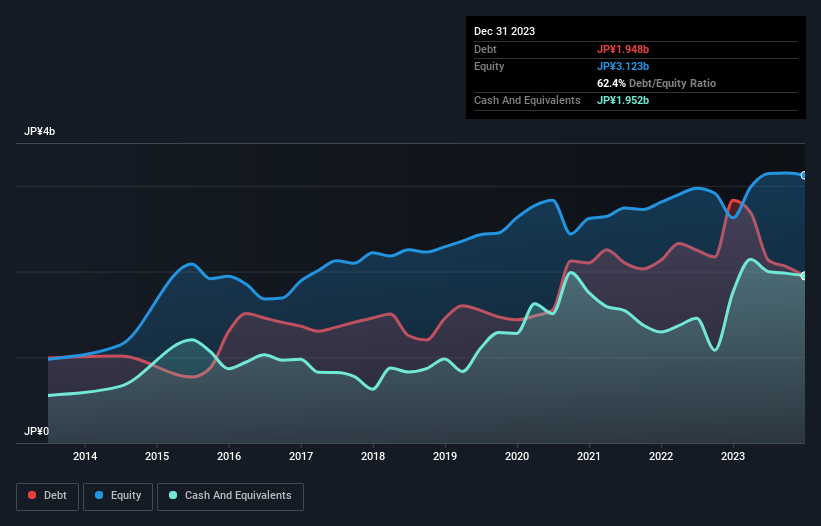
Legendary fund manager Li Lu (who Charlie Munger backed) once said, 'The biggest investment risk is not the volatility of prices, but whether you will suffer a permanent loss of capital.' So it seems the smart money knows that debt - which is usually involved in bankruptcies - is a very important factor, when you assess how risky a company is. We can see that Platz Co., Ltd. (TSE:7813) does use debt in its business. But the more important question is: how much risk is that debt creating?
What Risk Does Debt Bring?
Debt assists a business until the business has trouble paying it off, either with new capital or with free cash flow. If things get really bad, the lenders can take control of the business. While that is not too common, we often do see indebted companies permanently diluting shareholders because lenders force them to raise capital at a distressed price. Of course, the upside of debt is that it often represents cheap capital, especially when it replaces dilution in a company with the ability to reinvest at high rates of return. When we examine debt levels, we first consider both cash and debt levels, together.
View our latest analysis for Platz
What Is Platz's Debt?
The image below, which you can click on for greater detail, shows that Platz had debt of JP¥1.95b at the end of December 2023, a reduction from JP¥2.83b over a year. However, its balance sheet shows it holds JP¥1.95b in cash, so it actually has JP¥4.00m net cash.

How Strong Is Platz's Balance Sheet?
According to the last reported balance sheet, Platz had liabilities of JP¥1.45b due within 12 months, and liabilities of JP¥1.24b due beyond 12 months. Offsetting this, it had JP¥1.95b in cash and JP¥949.0m in receivables that were due within 12 months. So it can boast JP¥208.0m more liquid assets than total liabilities.
This short term liquidity is a sign that Platz could probably pay off its debt with ease, as its balance sheet is far from stretched. Simply put, the fact that Platz has more cash than debt is arguably a good indication that it can manage its debt safely.
It was also good to see that despite losing money on the EBIT line last year, Platz turned things around in the last 12 months, delivering and EBIT of JP¥75m. There's no doubt that we learn most about debt from the balance sheet. But you can't view debt in total isolation; since Platz will need earnings to service that debt. So when considering debt, it's definitely worth looking at the earnings trend. Click here for an interactive snapshot.
Finally, a business needs free cash flow to pay off debt; accounting profits just don't cut it. Platz may have net cash on the balance sheet, but it is still interesting to look at how well the business converts its earnings before interest and tax (EBIT) to free cash flow, because that will influence both its need for, and its capacity to manage debt. Happily for any shareholders, Platz actually produced more free cash flow than EBIT over the last year. There's nothing better than incoming cash when it comes to staying in your lenders' good graces.
Summing Up
While it is always sensible to investigate a company's debt, in this case Platz has JP¥4.00m in net cash and a decent-looking balance sheet. The cherry on top was that in converted 1,141% of that EBIT to free cash flow, bringing in JP¥856m. So we don't think Platz's use of debt is risky. There's no doubt that we learn most about debt from the balance sheet. However, not all investment risk resides within the balance sheet - far from it. Be aware that Platz is showing 4 warning signs in our investment analysis , and 1 of those can't be ignored...
Of course, if you're the type of investor who prefers buying stocks without the burden of debt, then don't hesitate to discover our exclusive list of net cash growth stocks, today.
New: Manage All Your Stock Portfolios in One Place
We've created the ultimate portfolio companion for stock investors, and it's free.
• Connect an unlimited number of Portfolios and see your total in one currency
• Be alerted to new Warning Signs or Risks via email or mobile
• Track the Fair Value of your stocks
Have feedback on this article? Concerned about the content? Get in touch with us directly. Alternatively, email editorial-team (at) simplywallst.com.
This article by Simply Wall St is general in nature. We provide commentary based on historical data and analyst forecasts only using an unbiased methodology and our articles are not intended to be financial advice. It does not constitute a recommendation to buy or sell any stock, and does not take account of your objectives, or your financial situation. We aim to bring you long-term focused analysis driven by fundamental data. Note that our analysis may not factor in the latest price-sensitive company announcements or qualitative material. Simply Wall St has no position in any stocks mentioned.
About TSE:7813
Platz
Produces and sells care beds, mattresses, and other add-on equipment in Japan.
Excellent balance sheet slight.

